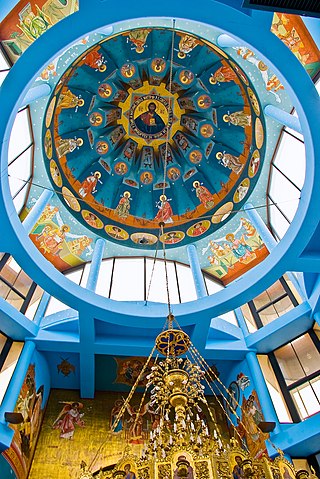Mystici Corporis Christi(The Mystical Body of Christ) is an encyclical issued by Pope Pius XII on 29 June 1943 during World War II. Its main topic is the Catholic Church as the Mystical Body of Christ.
Dum maerenti animo is an Apostolic Letter of Pope Pius XII to the faithful in Eastern Europe regarding their persecutions and the persecutions of the Church. "The whole family of Christianity stands in respectful admiration before you, and what you suffer in silence for so long. She prays for God’s mercy. She prays also for those who persecute you."
The Church policies after World War II of Pope Pius XII focused on material aid to war-torn Europe, the internationalization of the Roman Catholic Church, its persecution in Eastern Europe, China and Vietnam, and relations with the United States and the emerging European Union.
Ad Sinarum gentem, issued on October 7, 1954, is an encyclical of Pope Pius XII to the Chinese people on the super-nationality of the Church.
Novimus Nos is an Apostolic Letter of Pope Pius XII to the Catholic Bishops of the Eastern Catholic Rites, whose dioceses are devastated after years of persecution. The letter commemorates the 1000th anniversary of the conversion of Saint Olga, which was the beginning of Christianity in Russia.
Pope Pius XII and the Church in China involves relations of the Holy See with China from 1939 to 1958. The Vatican recognized Chinese rites in 1939, elevated the first Chinese cardinal in 1946, and established a Chinese hierarchy.
Ad Apostolorum principis is an encyclical of Pope Pius XII on Communism and the Church in China. It describes systematic persecutions of bishops, priests, religious and faithful and the attempts of the government to establish a patriotic Catholic Church, independent of Rome.
Evangelii praecones was an encyclical letter of Pope Pius XII about Catholic missions. In it, he described necessary improvements and changes, and the persecution of the Church in some parts of the world. The encyclical was issued in commemoration of the 25th anniversary of the encyclical Rerum ecclesiae by his predecessor Pope Pius XI.
Veritatem facientes is an apostolic letter of Pope Pius XII to the Catholic faithful of Romania, protesting against their persecution and the virtual eradication of the Catholic Church in their country. The letter asks for courage and prayers.
Acerrimo moerore is a letter of Pope Pius XII to the Hungarian Episcopate after the jailing and torturing of Cardinal Joseph Mindszenty.
Impensiore caritate is an Apostolic Letter of Pope Pius XII to the persecuted bishops, priests, and faithful of Czechoslovakia.
Gloriosam Reginam is a letter of Pope Pius XII to the Polish episcopate, to protest against the persecution of the Church in Poland, and, to commemorate the 300th anniversary of Jasna Góra, the Polish sanctuary of the Virgin Mary. The invincible Mother of God, who the pope says watches over the freedom for Poland, will most certainly assist.
Orientales ecclesias is an encyclical of Pope Pius XII concerning the persecution of the Eastern Catholic Churches and describing the desperate situation of the faithful in Communist Bulgaria.
Pope Pius XII and Russia describes relations of the Vatican with the Soviet Union, Russia, the Eastern Orthodox Church, and the Eastern Catholic Churches resulting in the eradication of the Church in most parts of the Soviet Union during the Stalinist era. Most persecutions of the Church occurred during the pontificate of Pope Pius XII.
Persecutions against the Catholic Church took place during the papacy of Pope Pius XII (1939–1958). Pius' reign coincided with World War II (1939–1945), followed by the commencement of the Cold War and the accelerating European decolonisation. During his papacy, the Catholic Church faced persecution under Fascist and Communist governments.
Pope Pius XII and Poland includes Church relations from 1939 to 1958. Pius XII became Pope on the eve of the Second World War. The invasion of predominantly Catholic Poland by Nazi Germany in 1939 ignited the conflict and was followed soon after by a Soviet invasion of the Eastern half of Poland, in accordance with an agreement reached between the dictators Joseph Stalin and Adolf Hitler. The Catholic Church in Poland was about to face decades of repression, both at Nazi and Communist hands. The Nazi persecution of the Catholic Church in Poland was followed by a Stalinist repression which was particularly intense through the years 1946–1956. Pope Pius XII's policies consisted in attempts to avoid World War II, extensive diplomatic activity on behalf of Poland and encouragement to the persecuted clergy and faithful.

The theology of Pope Pius XII is reflected in his forty-one encyclicals, as well as speeches and nearly 1000 messages, during his almost 20-year pontificate. The encyclicals Mystici corporis and Mediator Dei advanced the understanding of membership and participation in the Catholic Church. The encyclical Divino afflante Spiritu began opening the door to historical-critical biblical studies. But his magisterium was far larger and is difficult to summarize. In numerous speeches Catholic teaching is related to various aspects of life, education, medicine, politics, war and peace, the life of saints, Mary, the mother of God, things eternal and temporal.

The Mariology of the popes is the theological study of the influence that the popes have had on the development, formulation and transformation of the Roman Catholic Church's doctrines and devotions relating to the Blessed Virgin Mary.

Le pèlerinage de Lourdes is the only encyclical of Pope Pius XII issued in French. It includes warnings against materialism on the centenary of the apparitions at Lourdes. It was given at Rome, from St. Peter's Basilica, on the feast of the Visitation of the Most Holy Virgin, July 2, 1957, the nineteenth year of his pontificate.

Eastern Catholic victims of Soviet persecutions include bishops and others among the tens of thousands of victims of Soviet persecutions from 1918 to approximately 1980, under the state ideology of Marxist–Leninist atheism.



